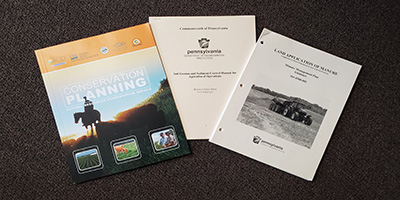Are you a farmer or do you own farmland in Pennsylvania? Do you own or manage livestock or poultry? Are you a certified Commercial Manure Hauler or Broker in Pennsylvania? If so, there are laws requiring written plans that all farmers must have and must implement. The plans protect water quality, as well as farm productivity and sustainability, using agronomically sound practices. In Bedford County, Conservation District staff are conducting the inspections to insure all operations have up-to-date Conservation (or Agricultural Erosion and Sedimentation) and Manure Management Plans.

These regulations are NOT new. The Pennsylvania Clean Streams Law which requires written Conservation Plans is over 50 years old! Some farmers have been in compliance with this regulation for decades. The Manure Management Plan requirements have been in place since 1985. Pennsylvania’s Commercial Manure Hauler and Broker Certification Program took effect in 2006 and regulates commercial spreading and transporting of manure. The enforcement of these longstanding agricultural regulations is designed to protect water quality, ensure continued farm productivity, and minimize the need for additional laws and regulations being enacted.
Water quality in Pennsylvania must be restored and protected. Our local streams, rivers and lakes provide drinking water to Pennsylvanians. They also provide recreation and wildlife and aquatic habitat. Since our local waters flow into larger water bodies, Pennsylvania is partnering with surrounding states to achieve significant, measurable water quality improvements in regional water resources such as the Chesapeake Bay. Since 1985, Pennsylvania has invested $4 billion toward local water quality improvements which support Chesapeake Bay restoration efforts. The investment has resulted in improved local water quality as well as in the Bay, but there is much more that must be done in Pennsylvania to provide clean water locally and regionally. Computer models show that Pennsylvania is doing well in addressing phosphorus loadings to the Bay; however, Pennsylvania needs to take additional steps to address local and regional nitrogen and sediment reduction goals. Pennsylvania’s wastewater treatment plants have achieved their required pollutant reduction goals. Agriculture still has a considerable way to go in meeting pollution reduction goals. Agriculture is the main player for reducing nutrients and sediments to streams. While agriculture has contributed to the water improvement efforts, many of these efforts have not been reported to give credit towards meeting these agricultural reduction goals. Even with previously uncounted efforts recently being counted, there is still much more that needs to be done by all of agriculture as well as the residential/urban stormwater sector.
Questions about Conservation Plans can be addressed to the Bedford office of the USDA Natural Resource Concervation Service (NRCS) at 814-623-7900.
Questions about Agriculture Erosion and Sedimentation (Ag E and S) Plans or Manure/Nutrient Management Plans can be addressed to Dan Over of the Conservation District at 814-803-1040.
Link to the Soil Erosion and Sediment Control Manual for Agricultural Operations: Click here.
NEW! 2024 Updated Land Application of Manure: Manure Management Plan Guidance Manual: Click here.
Link to the Department of Environmental Protection website page about manure management. Click here.
NEW! Brochure from PA Agricultural Ombudsman Program "Manure Spill Response in Pennsylvania"